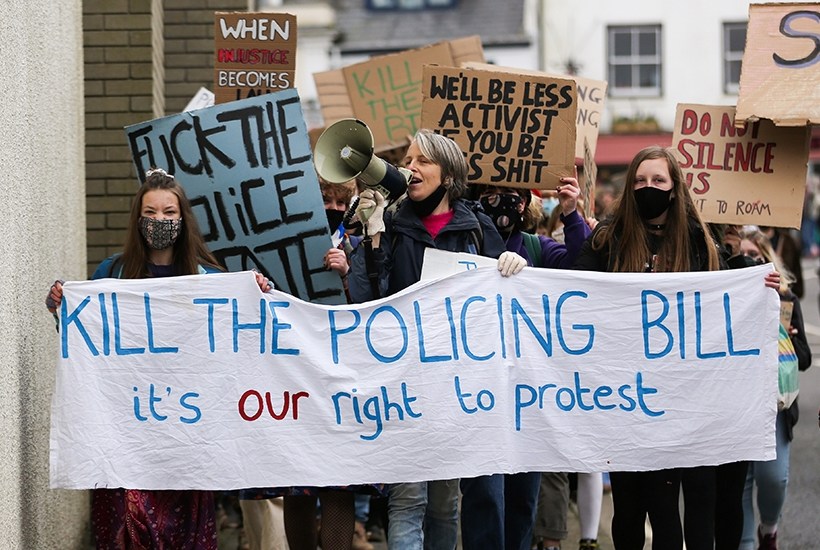I wonder exactly when we agreed that it is more of a priority to gather with strangers than to meet loved ones? You might chart a number of moments, but the presumption seems to have become fixed.
You might say that it started before the pandemic with the idea that truanting from school is worthy, even admirable, so long as it is done in opposition to climate change. Indeed as we learned this week, if you leave school for long enough then you may eventually have a statue erected to you in an English town known for its cathedral and school but not for its university. If you were an adult you could close down major cities, prevent newspapers from leaving the print-works and much more for the same cause. So long as you were saving the planet.
Once the coronavirus regulations came in all such protests went on hold. Only for it to turn out to be perfectly permissible to gather by the thousands so long as you were expressing support for ‘BLM’ and objecting to ‘racism’. Although the citizens of Bristol could not meet friends in a restaurant, it turned out they could meet at the town’s plinths, pull down the statuary and hurl it into the water. All while the Bristol police looked on passively. Because such actions never have repercussions.
As the months have gone by, other causes have come and gone as legitimate reasons for breaking lockdown, with better or worse justifications depending on your outlook. After the murder of Sarah Everard, plenty of people wanted to pay their respects to a murdered young woman. Soon those vigils became protests, and the police did their bit to make things worse. But the crucial thing is that whether you were on the side of the police or the protestors, everybody agreed that the protestors had the right to protest. Because they were objecting to young women being snatched off the streets and murdered. And though we cannot have a normal life, we can apparently go out to protest that highly unusual occurrence.
Lately the protests have become about the new crime bill and the right to protest itself: protests about protest. The ‘kill the bill’ demonstrators found a cute play on words, and the other day crowds in Bristol (imagine, of all places) tried to kill the actual bill by burning them alive.
Also last week, it turned out that another good reason to be able to break lockdown regulations comes if you fear that a drawing of the inventor of Islam has been shown to children in the Batley area. Specifically at the grammar school there. If you have reason to believe that this appalling crime has occurred, the police will allow you to gather outside the school gates and chant ‘Allahu Akbar’. The police will then read messages of supplication from the cowed school authorities inside busily suing for peace. And the police will stand alongside an imam — not using a mask — while he explains to a crowd of his supporters and assembled media that he wants a full independent inquiry into the incident staffed by fanatics of his choice.
This is a varied set of causes, to be sure. But all seem to have become legitimate reasons that we could offer as explanation if we wanted to stretch our legs. There is now no reason why we should not all throw large gatherings for our family and friends. If the police approach, we should simply explain that we are gathered because we are opposed to global warming, racism, the murder of young women, and aspects of RE teaching in the Batley area.
If they require any further proof then a few rounds of ‘Kill the bill’ and chants of ‘Allahu Akbar’ should stimulate the police to move on quietly.
Of course I’m by no means certain that the Batley protestors care a jot about the right to peaceful protest. Like many others, I suspect that they are perfectly happy to use it if it furthers their cause. Just as they are perfectly happy to trample a right (freedom of speech, freedom of conscience) if it goes against that same cause. But since everybody from every imaginable direction keeps saying that of course we must defend the right to peaceful protest, perhaps I might just sound a contrary note.
Not because I am against the right to protest, but rather because I am in favour of a decent order of priorities. This past year we have lived through periods when we couldn’t leave the house when we liked. When we didn’t have the right to visit our family and friends. When we couldn’t make new friends or acquaintances. When we couldn’t eat food we hadn’t cooked ourselves. When we couldn’t hear music, played live, sitting alongside other people. When we couldn’t see a play or a show. Where we couldn’t go into a shop and browse for a book. Where we were forbidden from going to church. We have lived through a year where people have been told not to sit with their loved ones as they were dying. Or hold a proper funeral.
So there is something off about this endless emphasis on the right to protest as though that right is agreed to have priority over all others. This seems to embed a particularly soulless left-wing view of life which sees its purpose as an endless set of struggles for a variety of political causes. Well, as it happens I don’t think that this is the purpose of life, or even a particularly good way to find meaning.
Life is not lived in order to attend protest marches. Outside a small group of malcontents, we do not find meaning in making or wielding placards. Life is lived in order to be lived. In time spent with the people we love, doing the things we love. Few of us on our deathbeds will regret that we failed to attend a ‘kill the bill’ protest or BLM march. Many of us will regret not having spent more time with the people we loved. So by all means worry about losing the right to protest if that right ever looked as though it were disappearing. But worry about the loss of absolutely every other right as well.
Got something to add? Join the discussion and comment below.
Get 10 issues for just $10
Subscribe to The Spectator Australia today for the next 10 magazine issues, plus full online access, for just $10.
You might disagree with half of it, but you’ll enjoy reading all of it. Try your first month for free, then just $2 a week for the remainder of your first year.














Comments
Don't miss out
Join the conversation with other Spectator Australia readers. Subscribe to leave a comment.
SUBSCRIBEAlready a subscriber? Log in